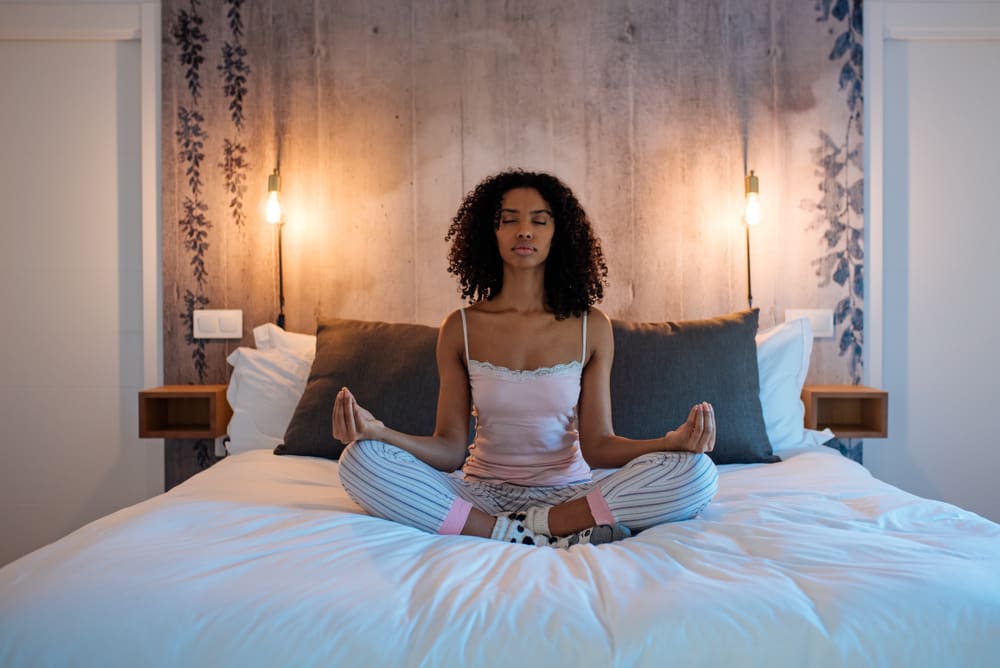Staring at the ceiling, counting sheep – sound familiar? Millions struggle with sleeplessness, often due to a mind that won’t switch off. The worries, anxieties, and to-do lists of the day linger, preventing us from drifting off to a peaceful slumber. This is where meditation steps in, offering a powerful tool for cultivating calm and lulling you into a restful sleep.
The Science Behind a Meditative Night’s Sleep
Meditation is more than just sitting cross-legged and chanting. It’s a practice backed by science, offering well-documented benefits for sleep quality. Here’s how meditation works its magic:
-
Stress Reduction Champion: Chronic stress is a major sleep disruptor. Meditation helps activate the parasympathetic nervous system, your body’s rest-and-digest response. This counteracts the fight-or-flight response triggered by stress, promoting relaxation and preparing your body for sleep.
-
Quieting the Mind Chatter: Our minds are like busy highways, constantly buzzing with thoughts and worries. Meditation techniques like mindfulness focus your attention on the present moment. By gently bringing your attention back to your breath when your mind wanders, you reduce the mental chatter that can keep you wide awake.
-
Deeper, More Restful Sleep: Studies have shown that meditation can lead to deeper, more restorative sleep. This means you wake up feeling more refreshed and energized for the day ahead. Imagine waking up without feeling like you need to hit the snooze button repeatedly!
Meditation for Everyone: Techniques for a Tranquil Night’s Sleep
The beauty of meditation lies in its accessibility. Here are a few beginner-friendly techniques you can incorporate into your bedtime routine:
-
Mindful Breathing: This is a simple yet powerful technique. Focus on your breath, feeling the rise and fall of your chest with each inhale and exhale. If your mind wanders, gently bring your attention back to your breath. Start with just a few minutes and gradually increase the duration as you become more comfortable.
-
Body Scan Meditation: Lie down comfortably and systematically focus your attention on each part of your body, starting from your toes and working your way up. Notice any physical sensations without judgment. This technique promotes relaxation and helps release tension held throughout the day.
-
Guided Meditation: Numerous guided meditations specifically designed for sleep exist. These meditations often use calming imagery or soothing sounds to guide you into a relaxed state. Many are available for free on meditation apps or online platforms. Explore and find a voice that resonates with you, creating a personalized sleep sanctuary.
Creating a Sleep-Conducive Environment
While meditation is a powerful tool, it works best when combined with good sleep hygiene habits. Here are some tips to create a sleep-conducive environment:
-
Sleep Schedule Superhero: Establish a sleep schedule and stick to it, even on weekends. Go to bed and wake up at consistent times to regulate your body’s natural sleep-wake cycle. This consistency helps your body know when it’s time to wind down and prepare for sleep.
-
Power Down Before Bed: Give your eyes and brain a break from screens! Avoid electronic devices like phones and laptops for at least an hour before bedtime. The blue light emitted by these devices can interfere with sleep patterns and make it harder to drift off.
-
Relaxing Bedtime Ritual: Create a calming routine before bed to signal to your body that it’s time to wind down. This could include taking a warm bath, reading a book, practicing gentle stretches, or listening to calming music. Find what works for you and create a relaxing pre-sleep ritual you can look forward to each night.
Meditation: Your Gateway to a Good Night’s Sleep
Making meditation a part of your bedtime routine can significantly improve your sleep quality. With a calmer mind and a relaxed body, you’ll be drifting off to dreamland in no time. Remember, consistency is key. The more you practice meditation, the more effective it will become in helping you achieve a restful night’s sleep and wake up feeling refreshed and ready to seize the day. So, dim the lights, take a deep breath, and start your journey toward a more peaceful sleep with meditation. Sweet dreams!
This story was created using AI technology.













